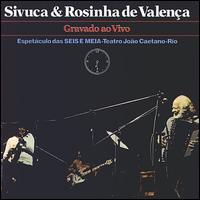
Clique aqui para baixar o disco/Download the album - RapidShare
........................................................
Embora já tivesse regressado ao Brasil há alguns meses, realizando uma temporada no Teatro do Hotel Nacional, Sivuca elegeu outro evento para celebrar “oficialmente” sua volta definitiva ao país: os shows em dupla com Rosinha de Valença no Teatro João Caetano, de 9 a 13 de maio de 1977.
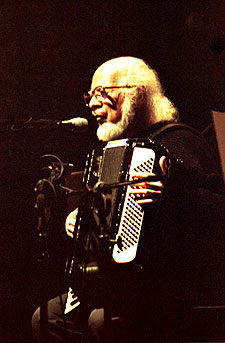 O espetáculo de cerca de duas horas e 27 músicas, idealizado e roteirizado pelo saudoso Albino Pinheiro, para o Projeto Seis e Meia, superlotou o Teatro durante uma semana. Filas homéricas formavam-se desde as primeiras horas da tarde, e muitos fãs, incluindo este que vos escreve, adquiriram ingressos para todas as noites. Gravado ao vivo em um equipamento de apenas quatro canais, o evento foi condensado em um LP (de 8 faixas e 37 minutos) coordenado por Sergio Cabral para a RCA.
O espetáculo de cerca de duas horas e 27 músicas, idealizado e roteirizado pelo saudoso Albino Pinheiro, para o Projeto Seis e Meia, superlotou o Teatro durante uma semana. Filas homéricas formavam-se desde as primeiras horas da tarde, e muitos fãs, incluindo este que vos escreve, adquiriram ingressos para todas as noites. Gravado ao vivo em um equipamento de apenas quatro canais, o evento foi condensado em um LP (de 8 faixas e 37 minutos) coordenado por Sergio Cabral para a RCA.Relançado agora, pela primeira vez, este álbum simplesmente fenomenal capta algumas das mais expressivas performances daquele encontro entre dois dos maiores músicos brasileiros de todos os tempos. Por questões burocráticas – Rosinha de Valença era contratada exclusiva da EMI/Odeon -, Sivuca ficou com o maior número de faixas. Cinco, no total. Em duas outras (“Asa Branca” e “Lamento”), divide o spot com Rosinha, que aparece como solista principal em apenas uma faixa (“Tema do Boneco de Palha”), ainda assim com Sivuca no violão de base. No apoio, um timaço recrutado para tal efeméride: Luiz Carlos dos Santos (baterista original da Banda Black Rio, participante do “Feel No Fret” da Average White Band), Jamil Joanes (baixo elétrico, outro da Black Rio), Darcy (percussão) e Raul Mascarenhas (saxofone tenor e flauta). Todos, para “agravar” a situação, super-entrosados apesar do pouco tempo de ensaio, e tocando com uma vibração contagiante.
Vindo de décadas de trabalho na Europa e nos Estados Unidos (ao lado de Miriam Makeba, Harry Belafonte, Airto Moreira, Luiz Henrique, Dom Um Romão e Oscar Brown, Jr., além da notável carreira como líder), Severino Dias de Oliveira - paraibano de Itabaiana, nascido em 26 de maio de 1930 - domina todas as faixas que formavam o Lado A do LP original. A começar por uma inspiradíssima nova composição, “Homenagem a Velha Guarda”, que pouco depois seria gravada por Clara Nunes , após receber letra de Paulo César Pinheiro, no disco “As Forças da Natureza”.
A segunda faixa, divida em duas performances emocionantes, documenta o grande momento do concerto. Primeiro, sozinho na sanfona, o gênio mergulha em virtuosística execução da valsa “Quando Me Lembro”, de Luperce Miranda, não sem antes avisar à platéia que “na última parte, ele (Luperce) tentava imitar dois bandolins num só; como não temos bandolins aqui, vou tentar imitar os dois bandolins na sanfona”. Depois, realiza uma série de variações sobre o famoso frevo “Vassourinhas”, satirizando como seriam as interpretações na China, nos países árabes, na antiga União Soviética, na Argentina, na Escócia (imitando, com perfeição, uma gaita de fole), até desembarcar em Recife, “numa terça-feira de Carnaval, na Avenida Guararapes”, realizando crepitante versão destacando o famoso vocal em uníssono com a sanfona, uma de suas marcas-registradas.
Previamente gravada nos EUA pela cantora sul-africana Letta Mbulu, “Reunião de Tristeza”, letra e música de Sivuca, número-solo de violão e voz, retrata, em seu lirismo pungente, o sentimento do compositor diante da morte de uma de suas irmãs. “Ela faleceu em 1935, aos nove anos de idade. Aquele momento de tristeza ficou no meu coração por anos a fio, até que um dia, em Ottawa, no Canadá, mais de trinta anos depois, a dor se transmutou em música”, relembra Sivuca. Na sequência, transforma o show em baile irresistível através do forró “Feira de Mangaio”, parceria com a esposa Glorinha Gadelha posteriormente incorporada ao repertório de Clara Nunes no LP “Esperança”, de 1979. Ainda ao violão, mas com apoio do conjunto, destacando solo do tenorista Raul Mascarenhas (então marido de Fafá de Belém), revisita um de seus maiores sucessos, “Adeus, Maria Fulô”, parceria com Humberto Teixeira e tema de abertura de seus shows nos Estados Unidos – inclusive na obra-prima “Sivuca Live at the Village Gate” (75).
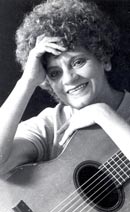 Na faixa que abria o Lado B, finalmente Sivuca & Rosinha atuam juntos, descendo o sarrafo em jazzística versão do clássico “Asa Branca”, gravado anteriormente por Rosinha, em 71, no disco “Um Violão Em Primeiro Plano”. Sivuca pilota um órgão Yamaha no qual faz misérias, produzindo distorções e efeitos (típicos dos sintetizadores Arp e Moog) durante solo de intensa criatividade, sobre viradas endiabradas do batera Luiz Carlos. Rosinha também mostra uma linguagem de improviso extremamente original e brasileira, algo infelizmente não assimilado pelas novas gerações de nossos violonistas, que insistem em ignorar as obras de outros mestres como Laurindo Almeida, Luiz Bonfá e Bola Sete. Em duo de violões, novamente abrindo espaço para improvisos notáveis, Rosinha & Sivuca levam o público ao delírio em “Lamento”, do mestre Pixinguinha.
Na faixa que abria o Lado B, finalmente Sivuca & Rosinha atuam juntos, descendo o sarrafo em jazzística versão do clássico “Asa Branca”, gravado anteriormente por Rosinha, em 71, no disco “Um Violão Em Primeiro Plano”. Sivuca pilota um órgão Yamaha no qual faz misérias, produzindo distorções e efeitos (típicos dos sintetizadores Arp e Moog) durante solo de intensa criatividade, sobre viradas endiabradas do batera Luiz Carlos. Rosinha também mostra uma linguagem de improviso extremamente original e brasileira, algo infelizmente não assimilado pelas novas gerações de nossos violonistas, que insistem em ignorar as obras de outros mestres como Laurindo Almeida, Luiz Bonfá e Bola Sete. Em duo de violões, novamente abrindo espaço para improvisos notáveis, Rosinha & Sivuca levam o público ao delírio em “Lamento”, do mestre Pixinguinha. Na faixa final, Maria Rosa Canelas (nascida em Valença, em 30 de julho de 1941, levada para o Rio pelo baterista Dom Um Romão), barbariza ao relembrar “Tema do Boneco de Palha”. Consegue, graças a uma execução swingadíssima, além de um show à parte do baixista Jamil Joanes, até mesmo superar o registro original de sua estréia para o selo Elenco em 1963, o LP “Apresentando Rosinha de Valença”, que estabeleceu o nome artístico dado por Sérgio Porto, o Stanislaw Ponte Preto, que a apresentava como “a menina que toca por uma cidade inteira”.
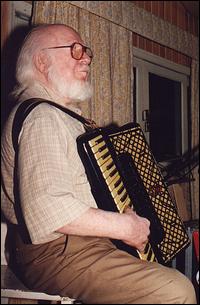 Marco inicial de uma brilhante trajetória no Brasil e no exterior, onde chegou a integrar o grupo Brasil 65, de Sergio Mendes. De volta ao Rio, liderava seus próprios conjuntos, volta e meia atuando com Maria Bethânia e Martinho da Vila, até sofrer, há dez anos, um derrame cerebral que a deixou até hoje em estado vegetativo.
Marco inicial de uma brilhante trajetória no Brasil e no exterior, onde chegou a integrar o grupo Brasil 65, de Sergio Mendes. De volta ao Rio, liderava seus próprios conjuntos, volta e meia atuando com Maria Bethânia e Martinho da Vila, até sofrer, há dez anos, um derrame cerebral que a deixou até hoje em estado vegetativo.Além das músicas escolhidas para o álbum, figuravam também no repertório do show: Primeiro Amor, Tico Tico no Fubá, Pedacinho do Céu, Consolação, Caboclo Ubiratan, De Amor Eu Morrerei, Tristeza Em Mim, Berimbau, Com Quem Roupa, After Sunrise, Brasileirinho, Como é Grande e Bonita A Natureza, Testamento de Sambista, Serena no Mar, Saudades do Matão, Remelexo, Usina de Prata e Chuá Chuá.
Contemplar as arrebatadoras interpretações de Sivuca & Rosinha de Valença neste disco ao vivo, com todos os músicos tocando com emoção à flor da pele, nos possibilita sentir a mesma atmosfera mágica que inebriou a platéia. E representa também a oportunidade de repensar equivocados conceitos como a ridícula divisão entre música “cantada” e “instrumental”, apregoada por preconceituosos desprovidos de inteligência e bom-senso. Um entrave a mais que os terroristas xiitas da MPB colocam no caminho evolutivo da nossa música.
************************
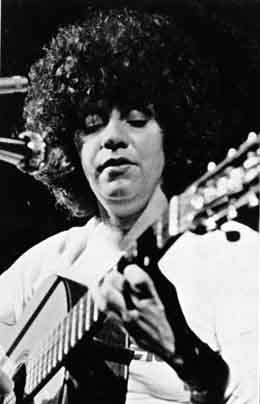 There are certain types of music that just wouldn't be the same without the accordion. One is Louisiana zydeco. Another is norteño/Tex-Mex, a Mexican-American form that combines Mexican ranchera with the German polka beat. And in Brazil, the accordion has played a prominent role in baião, a style that comes from the northeastern part of the country. If the seminal Luiz Gonzaga was the King of Baião, Sivuca is certainly among the people who belongs in the royal palace. The singer/accordion virtuoso doesn't play baião exclusively — he can handle anything from choro to bossa nova — but baião is certainly one of his strong points. And he shows his versatility on Gravado ao Vivo, which offers a diverse program of baião, choro, and samba. This Brazilian reissue focuses on a 1977 concert at Teatro João Caetano in Rio de Janeiro, where Sivuca shared the stage and the spotlight with guitarist Rosinha de Valença. The performances on this album range from instrumentals (which include Pixinguinha's "Lamento" and the Gonzaga standard "Asa Branca") to vocal offerings such as the melancholy "Reunião de Tristeza" (a Sivuca original) and the well-known "Adeus, Maria Fulô." While "Tema do Boneco de Palha" becomes a showcase for de Valença's acoustic guitar, "Asa Branca" is a perfect example of accordion-powered baião. It should be noted that Sivuca and de Valença don't play together on all of the selections — they share the spotlight, and only on "Asa Branca" and "Lamento" do they actually play together. But whether Sivuca or de Valença (or both) is enjoying the spotlight, Gravado ao Vivo is a pleasing document of that 1977 concert in Rio.
There are certain types of music that just wouldn't be the same without the accordion. One is Louisiana zydeco. Another is norteño/Tex-Mex, a Mexican-American form that combines Mexican ranchera with the German polka beat. And in Brazil, the accordion has played a prominent role in baião, a style that comes from the northeastern part of the country. If the seminal Luiz Gonzaga was the King of Baião, Sivuca is certainly among the people who belongs in the royal palace. The singer/accordion virtuoso doesn't play baião exclusively — he can handle anything from choro to bossa nova — but baião is certainly one of his strong points. And he shows his versatility on Gravado ao Vivo, which offers a diverse program of baião, choro, and samba. This Brazilian reissue focuses on a 1977 concert at Teatro João Caetano in Rio de Janeiro, where Sivuca shared the stage and the spotlight with guitarist Rosinha de Valença. The performances on this album range from instrumentals (which include Pixinguinha's "Lamento" and the Gonzaga standard "Asa Branca") to vocal offerings such as the melancholy "Reunião de Tristeza" (a Sivuca original) and the well-known "Adeus, Maria Fulô." While "Tema do Boneco de Palha" becomes a showcase for de Valença's acoustic guitar, "Asa Branca" is a perfect example of accordion-powered baião. It should be noted that Sivuca and de Valença don't play together on all of the selections — they share the spotlight, and only on "Asa Branca" and "Lamento" do they actually play together. But whether Sivuca or de Valença (or both) is enjoying the spotlight, Gravado ao Vivo is a pleasing document of that 1977 concert in Rio. 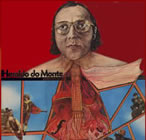
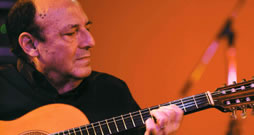 Heraldo Do Monte nasceu em 1º de maio de 1935 na cidade de Recife, Pernambuco. Um dos pais da nossa música instrumental, tem a carreira marcada pela formação do lendário Quarteto Novo, com Hermeto Pascoal, Airto Moreira e Téo de Barros. Na era de ouro dos festivais - anos 60 e 70 - , o grupo mudou os rumos da nossa improvisação, tornando-a tão moderna quanto brasileira. Multiinstrumentista, toca guitarra, violão, baixo, banjo, bandolim e cavaquinho e, é claro, viola nordestina. Participou de centenas de discos de outros artistas como instrumentista e arranjador e ganhou praticamente todos os prêmios importantes de música do Brasil, como o Sharp em 1994 e em 1995.
Heraldo Do Monte nasceu em 1º de maio de 1935 na cidade de Recife, Pernambuco. Um dos pais da nossa música instrumental, tem a carreira marcada pela formação do lendário Quarteto Novo, com Hermeto Pascoal, Airto Moreira e Téo de Barros. Na era de ouro dos festivais - anos 60 e 70 - , o grupo mudou os rumos da nossa improvisação, tornando-a tão moderna quanto brasileira. Multiinstrumentista, toca guitarra, violão, baixo, banjo, bandolim e cavaquinho e, é claro, viola nordestina. Participou de centenas de discos de outros artistas como instrumentista e arranjador e ganhou praticamente todos os prêmios importantes de música do Brasil, como o Sharp em 1994 e em 1995. Seu primeiro LP, "Heraldo e seu Conjunto", foi lançado em 1960, logo seguido por "Dançando com o Sucesso" volumes 1 e 2. Em 1966, o artista entrou para o Trio Novo, que em seguida se tornaria o Quarteto Novo, com a adição de Hermeto Pascoal. Depois que o grupo se desfez, acompanhou nomes como Michel Legrand e o Zimbo Trio, e tocou em festivais em Montreux, Montreal e Cuba.
Seu primeiro LP, "Heraldo e seu Conjunto", foi lançado em 1960, logo seguido por "Dançando com o Sucesso" volumes 1 e 2. Em 1966, o artista entrou para o Trio Novo, que em seguida se tornaria o Quarteto Novo, com a adição de Hermeto Pascoal. Depois que o grupo se desfez, acompanhou nomes como Michel Legrand e o Zimbo Trio, e tocou em festivais em Montreux, Montreal e Cuba.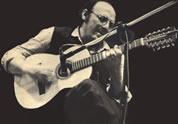 Lançou, em 1970, o LP "O violão de Heraldo do Monte". Em 1980, gravou o LP "Heraldo do Monte". Em 1982, lançou, com Elomar, Arthur Moreira Lima e Paulo Moura, o LP "ConSertão". Ainda na década de 1980, gravou os LPs "Cordas vivas" (1983) e "Cordas mágicas" (1986). Em 1988, participou do Festival de Jazz de Montreal (Canadá). Recebeu por duas vezes consecutivas o Prêmio Sharp na categoria de Melhor Arranjador, pelos discos gravados por Dominguinhos em 1994 e 1995. Apresentou-se em shows, acompanhado do percussionista João Paraíba e do guitarrista Luís do Monte. Dividiu com o Duofel um CD de uma série que reuniu grandes instrumentistas brasileiros. Ao longo de sua carreira, atuou com vários artistas como Hermeto Pascoal, Dominguinhos, Edu Lobo, Zimbo Trio, Geraldo Vandré, Johny Alf e Michael Legrand, entre outros. Lançou, em 2000, o CD "Viola nordestina" e, em 2003, com Teca Calazans, o CD "Teca Calazans & Heraldo do Monte".
Lançou, em 1970, o LP "O violão de Heraldo do Monte". Em 1980, gravou o LP "Heraldo do Monte". Em 1982, lançou, com Elomar, Arthur Moreira Lima e Paulo Moura, o LP "ConSertão". Ainda na década de 1980, gravou os LPs "Cordas vivas" (1983) e "Cordas mágicas" (1986). Em 1988, participou do Festival de Jazz de Montreal (Canadá). Recebeu por duas vezes consecutivas o Prêmio Sharp na categoria de Melhor Arranjador, pelos discos gravados por Dominguinhos em 1994 e 1995. Apresentou-se em shows, acompanhado do percussionista João Paraíba e do guitarrista Luís do Monte. Dividiu com o Duofel um CD de uma série que reuniu grandes instrumentistas brasileiros. Ao longo de sua carreira, atuou com vários artistas como Hermeto Pascoal, Dominguinhos, Edu Lobo, Zimbo Trio, Geraldo Vandré, Johny Alf e Michael Legrand, entre outros. Lançou, em 2000, o CD "Viola nordestina" e, em 2003, com Teca Calazans, o CD "Teca Calazans & Heraldo do Monte".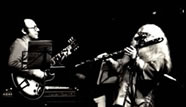 Former member of the historic Northeastern jazz group Quarteto Novo, Heraldo do Monte also developed an important solo career. His album Cordas Vivas (1983) was already released in 22 countries. He has played with Michel Legrand, Dick Farney, Zimbo Trio, Walter Wanderley, and Paulo Moura and performed abroad in international festivals of Cuba, Montreal, and Montreux. He already became a professional in Rio, playing with Walter Wanderley in 1956 and with Dick Farney in 1960. His first recording came as a sessionman in a Dolores Duran album, with Walter Wanderley. His first solo album was recorded in 1960, Heraldo E Seu Conjunto. He wrote all of the arrangements for the group Os Cincopados and participated in their 1965 recording. As a member of the Orquestra de Carlos Piper, he was awarded with the Guarani and Roquette Pinto trophies (1965). With the group Quarteto Novo, he was also awarded with the Roquette Pinto and received the Imprensa trophy twice. In 1975, he backed Michel Legrand in his live performances at the Teatro Municipal of São Paulo. He also performed with the Zimbo Trio. In 1980, he performed and recorded an album with Elomar and Arthur Moreira Lima, and, two years later, he did the same with Elomar, Arthur Moreira Lima, and Paulo Moura in the famous show ConSertão. In 1997, the four of them played together again in the Kaiser Bock Winter Festival. In 1988, he participated in the Montreal International Jazz Festival (Canada). He also participated in the Montreux and Cuba festivals. In 1994 and 1995 he was awarded with the Prêmio Sharp as arranger of two Dominguinhos' albums. His ''Chuva Morna,'' included in O Piano Brasileiro de Arthur Moreira Lima, is one of his songs recorded by famous interpreters. In 1997, together with Arthur Moreira Lima and Paulo Moura, he represented Brazil in the Caribbean International Music Festival. In 1998 he arranged, conducted, and played in the album Baião: 50 Anos de Poesia, Ritmo e Emoção, together with Hermeto Pascoal, Sivuca, Renato Borghetti, Oswaldinho, and Dominguinhos. In June, he played with the French guitar player Raphael Fays at the Sesc Ipiranga (São Paulo). In 2000, he participated in the Moacir Santos tribute at the Memorial da América Latina, São Paulo, with Johnny Alf, Leila Pinheiro, Roberto Sion, Teco Cardoso, and Mané Silveira.
Former member of the historic Northeastern jazz group Quarteto Novo, Heraldo do Monte also developed an important solo career. His album Cordas Vivas (1983) was already released in 22 countries. He has played with Michel Legrand, Dick Farney, Zimbo Trio, Walter Wanderley, and Paulo Moura and performed abroad in international festivals of Cuba, Montreal, and Montreux. He already became a professional in Rio, playing with Walter Wanderley in 1956 and with Dick Farney in 1960. His first recording came as a sessionman in a Dolores Duran album, with Walter Wanderley. His first solo album was recorded in 1960, Heraldo E Seu Conjunto. He wrote all of the arrangements for the group Os Cincopados and participated in their 1965 recording. As a member of the Orquestra de Carlos Piper, he was awarded with the Guarani and Roquette Pinto trophies (1965). With the group Quarteto Novo, he was also awarded with the Roquette Pinto and received the Imprensa trophy twice. In 1975, he backed Michel Legrand in his live performances at the Teatro Municipal of São Paulo. He also performed with the Zimbo Trio. In 1980, he performed and recorded an album with Elomar and Arthur Moreira Lima, and, two years later, he did the same with Elomar, Arthur Moreira Lima, and Paulo Moura in the famous show ConSertão. In 1997, the four of them played together again in the Kaiser Bock Winter Festival. In 1988, he participated in the Montreal International Jazz Festival (Canada). He also participated in the Montreux and Cuba festivals. In 1994 and 1995 he was awarded with the Prêmio Sharp as arranger of two Dominguinhos' albums. His ''Chuva Morna,'' included in O Piano Brasileiro de Arthur Moreira Lima, is one of his songs recorded by famous interpreters. In 1997, together with Arthur Moreira Lima and Paulo Moura, he represented Brazil in the Caribbean International Music Festival. In 1998 he arranged, conducted, and played in the album Baião: 50 Anos de Poesia, Ritmo e Emoção, together with Hermeto Pascoal, Sivuca, Renato Borghetti, Oswaldinho, and Dominguinhos. In June, he played with the French guitar player Raphael Fays at the Sesc Ipiranga (São Paulo). In 2000, he participated in the Moacir Santos tribute at the Memorial da América Latina, São Paulo, with Johnny Alf, Leila Pinheiro, Roberto Sion, Teco Cardoso, and Mané Silveira.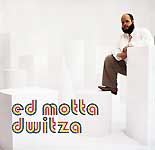
 Para explicar o espírito de seu novo disco, Ed Motta faz um paralelo com a tradição no preparo do churrasco gaúcho. "A carne só precisa do sal, mais do que isso você já está começando a tirar os elementos naturais dela. Dwitza é mais ou menos assim. É uma espécie de churrasco de música, que soa o mais natural possível", compara o músico. Essa analogia explica o aviso que aparece no encarte do CD, informando que a dinâmica e as vozes dos instrumentos foram mantidas durante a gravação, a mixagem e a masterização. E que não foram utilizados equipamentos de estúdio como reverberadores, equalizadores e compressores. "Hoje, tecnicamente falando, grande parte dos discos produzidos têm o mesmo som por causa desses equipamentos", comenta. "Porque as pessoas ficam dentro do estúdio com um analisador de espectro, gravando um disco como se estivessem fazendo um vôo", diz o cantor, 30 anos, cinéfilo de carteirinha, enólogo, fã de história em quadrinhos, colecionador e garimpador de discos em sebos.
Para explicar o espírito de seu novo disco, Ed Motta faz um paralelo com a tradição no preparo do churrasco gaúcho. "A carne só precisa do sal, mais do que isso você já está começando a tirar os elementos naturais dela. Dwitza é mais ou menos assim. É uma espécie de churrasco de música, que soa o mais natural possível", compara o músico. Essa analogia explica o aviso que aparece no encarte do CD, informando que a dinâmica e as vozes dos instrumentos foram mantidas durante a gravação, a mixagem e a masterização. E que não foram utilizados equipamentos de estúdio como reverberadores, equalizadores e compressores. "Hoje, tecnicamente falando, grande parte dos discos produzidos têm o mesmo som por causa desses equipamentos", comenta. "Porque as pessoas ficam dentro do estúdio com um analisador de espectro, gravando um disco como se estivessem fazendo um vôo", diz o cantor, 30 anos, cinéfilo de carteirinha, enólogo, fã de história em quadrinhos, colecionador e garimpador de discos em sebos.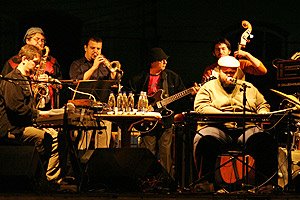 Dwitza - what does it mean? Is it a word, a name, a sound or a feeling? It's all of these and more. It's a word that conveys the heartfelt work of a man who enjoys his work like no other. "I invented the word Dwitza for three reasons," relates Ed, "firstly, because of the graphic quality of the word. I wanted to be in total control of my own universe for this record, from the sounds to the art direction. Secondly, the sound of the word - impossible to mispronounce in any language. Thirdly, to embody the spirit of all these songs, the titles of which have no literal meaning."
Dwitza - what does it mean? Is it a word, a name, a sound or a feeling? It's all of these and more. It's a word that conveys the heartfelt work of a man who enjoys his work like no other. "I invented the word Dwitza for three reasons," relates Ed, "firstly, because of the graphic quality of the word. I wanted to be in total control of my own universe for this record, from the sounds to the art direction. Secondly, the sound of the word - impossible to mispronounce in any language. Thirdly, to embody the spirit of all these songs, the titles of which have no literal meaning." 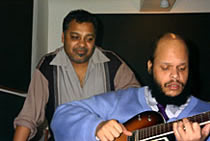 Young artists are supposed to be bold, right? Well, in these days, not always. After 20 years in which the younger generations of Brazilian artists seemed too tired to try something different, here's a breath of fresh air for the category. Ed Motta, the young kid who had become an instant pop hero in the early 90's, with his tasty, funky tunes in the style of his late uncle Tim Maia, took a U-turn on his music. Obviously influenced by his own heroes (some of which, unfortunately, known mostly in the alternative scene, but great nevertheless, like Dom Salvador, Moacir Santos, Guinga) he was brave enough to take the risk of shocking his established audiences and brings us a collection of wordless tunes, expressing his musical thoughts and ideas, backed by a fine band and with a daring concept regarding the (un)uses of language.
Young artists are supposed to be bold, right? Well, in these days, not always. After 20 years in which the younger generations of Brazilian artists seemed too tired to try something different, here's a breath of fresh air for the category. Ed Motta, the young kid who had become an instant pop hero in the early 90's, with his tasty, funky tunes in the style of his late uncle Tim Maia, took a U-turn on his music. Obviously influenced by his own heroes (some of which, unfortunately, known mostly in the alternative scene, but great nevertheless, like Dom Salvador, Moacir Santos, Guinga) he was brave enough to take the risk of shocking his established audiences and brings us a collection of wordless tunes, expressing his musical thoughts and ideas, backed by a fine band and with a daring concept regarding the (un)uses of language. 
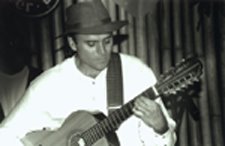 Um salto de jaguatirica no passado. Esta é a melhor imagem para o álbum instrumental do violonista Almir Sater, agora relançado em CD. Sater tentava criar uma linha progressiva para a viola, cujo estilo de execução é tão peculiar. Inspirado em seu professor, Renato de Andrade, o músico recriou um clássico do sertão - "Rio de Lágrimas" (Tião Carreiro - Lorival dos Santos - Piraci) - e apresentou diversas composições suas fundamentadas no folclore do Pantanal. Exibia técnica perfeita e delicadeza nos solos rápidos. Muito antes da novela Pantanal (1990), em que fez o personagem diabólico do Cramulhão, Sater traía um gosto pelas toadas e guarânias típicas do rio Paraguai e imediações. Pena o personagem ter tomado a tragetória do artista, a ponto de ele ter-se esquecido do ouro que encontrou no bojo de sua viola em meados dos anos 80.
Um salto de jaguatirica no passado. Esta é a melhor imagem para o álbum instrumental do violonista Almir Sater, agora relançado em CD. Sater tentava criar uma linha progressiva para a viola, cujo estilo de execução é tão peculiar. Inspirado em seu professor, Renato de Andrade, o músico recriou um clássico do sertão - "Rio de Lágrimas" (Tião Carreiro - Lorival dos Santos - Piraci) - e apresentou diversas composições suas fundamentadas no folclore do Pantanal. Exibia técnica perfeita e delicadeza nos solos rápidos. Muito antes da novela Pantanal (1990), em que fez o personagem diabólico do Cramulhão, Sater traía um gosto pelas toadas e guarânias típicas do rio Paraguai e imediações. Pena o personagem ter tomado a tragetória do artista, a ponto de ele ter-se esquecido do ouro que encontrou no bojo de sua viola em meados dos anos 80.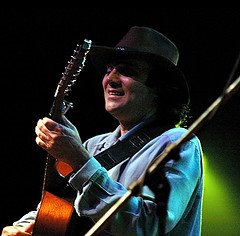 Born in Mato Grosso do Sul (CW), he used to play the guitar as a child, but only discovered the viola caipira (an adapted acoustic guitar, smaller than the usual 6-string, used in the countryside) in Rio de Janeiro, where he was studying Law. Sater gave up becoming a lawyer and, instead, decided to take guitar lessons with Tião Carreiro. Later, he returned to Campo Grande (capital of Mato Grosso do Sul) and lined-up the duo Lupe & Lampião. In 1979, he moved to São Paulo, becoming a back up musician to singers like Tetê Spíndola and Diana Pequeno. His debut album, "Almir Sater", was released on Continental in 1981, followed by "Dona", on RGE. Three years later, he put the Comitiva Esperança together, touring the pantanal region and researching the music from the area. After releasing other albums and playing the Free Jazz festival, in 1989, Sater played a part in a soap-opera, which helped projecting his music. He released "Terra dos Sonhos" in 1994.
Born in Mato Grosso do Sul (CW), he used to play the guitar as a child, but only discovered the viola caipira (an adapted acoustic guitar, smaller than the usual 6-string, used in the countryside) in Rio de Janeiro, where he was studying Law. Sater gave up becoming a lawyer and, instead, decided to take guitar lessons with Tião Carreiro. Later, he returned to Campo Grande (capital of Mato Grosso do Sul) and lined-up the duo Lupe & Lampião. In 1979, he moved to São Paulo, becoming a back up musician to singers like Tetê Spíndola and Diana Pequeno. His debut album, "Almir Sater", was released on Continental in 1981, followed by "Dona", on RGE. Three years later, he put the Comitiva Esperança together, touring the pantanal region and researching the music from the area. After releasing other albums and playing the Free Jazz festival, in 1989, Sater played a part in a soap-opera, which helped projecting his music. He released "Terra dos Sonhos" in 1994.
 Em 1981 foi lançado um dos discos mais importantes de toda a história da música brasileira, reunindo dois dos maiores instrumentistas brasileiros de todos os tempos. Parece exagero? Mas pode acreditar que não é. O disco Samambaia de Cesar Camargo Mariano e Hélio Delmiro é de fato um marco na nossa música e uma gravação absolutamente imprescindível para qualquer músico que queira dominar a linguagem da música brasileira, não somente pianistas e violonistas.
Em 1981 foi lançado um dos discos mais importantes de toda a história da música brasileira, reunindo dois dos maiores instrumentistas brasileiros de todos os tempos. Parece exagero? Mas pode acreditar que não é. O disco Samambaia de Cesar Camargo Mariano e Hélio Delmiro é de fato um marco na nossa música e uma gravação absolutamente imprescindível para qualquer músico que queira dominar a linguagem da música brasileira, não somente pianistas e violonistas.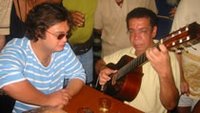 In the original liner notes for Samambaia, Mariano sums up the dream realization it was to record that album with Hélio Delmiro, one of Brazil's most respected and sough-after musicians:
In the original liner notes for Samambaia, Mariano sums up the dream realization it was to record that album with Hélio Delmiro, one of Brazil's most respected and sough-after musicians: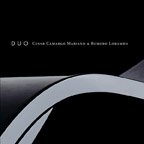
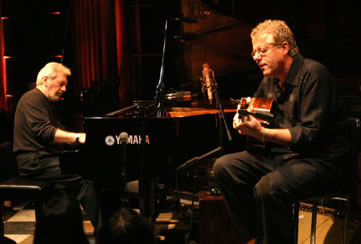 O DVD tem 13 canções, mais 2 faixas bônus.No repertório, clássicos da música brasiliera como No Rancho Fundo (Ary Barroso e Lamartine Babo) e Wave e Fotografia (Tom Jobim). Há também 6 composições de César, como as famosas Samambaia e Cristal e uma de Romero (Mr. Junior). Logo na primeira faixa, Samba Dobrado (composição de Djavan), os músicos mostram que a intregração do samba do César e do jazz de Romero não poderia ser mais perfeita. Em Choro Nº 7, os dois músicos dialogam com frases musicais perfeitas, deixando a pequena platéia do restaurante Fasano ( onde o DVD foi gravado) de boca aberta. É interessante ver a expressão no rosto do também musico Tom Zé, que assiste a apresentação bem atrás de César e parece não acreditar no que vê e ouve. O DVD ainda traz o making off da gravação com depoimentos dos profissionais envolvidos no projeto e um documentário no qual César e Romero falam do encontro dos dois e contam histórias curiosas, como a do estúdio onde o CD (lançado em 2002) foi gravado que foi construído numa antiga estação de trem. Mas detalhe, o trem ainda passa por lá e os músicos são avisados quando uma composição se aproxima para que possam parar a gravação. Ainda há os depoimentos de John Pizzareli, Maria Schneider e Chico Pinheiro. Em entrevista exclusiva para Música & Afins, diretamente de New Jersey, onde vive, César Camargo Mariano revela detelhes do seu encontro com Romero Lubambo, fala sobre a gravação do DVD, comenta sobre a atual situação da música brasileira e da emoção de tocar com a nova geração da MPB.
O DVD tem 13 canções, mais 2 faixas bônus.No repertório, clássicos da música brasiliera como No Rancho Fundo (Ary Barroso e Lamartine Babo) e Wave e Fotografia (Tom Jobim). Há também 6 composições de César, como as famosas Samambaia e Cristal e uma de Romero (Mr. Junior). Logo na primeira faixa, Samba Dobrado (composição de Djavan), os músicos mostram que a intregração do samba do César e do jazz de Romero não poderia ser mais perfeita. Em Choro Nº 7, os dois músicos dialogam com frases musicais perfeitas, deixando a pequena platéia do restaurante Fasano ( onde o DVD foi gravado) de boca aberta. É interessante ver a expressão no rosto do também musico Tom Zé, que assiste a apresentação bem atrás de César e parece não acreditar no que vê e ouve. O DVD ainda traz o making off da gravação com depoimentos dos profissionais envolvidos no projeto e um documentário no qual César e Romero falam do encontro dos dois e contam histórias curiosas, como a do estúdio onde o CD (lançado em 2002) foi gravado que foi construído numa antiga estação de trem. Mas detalhe, o trem ainda passa por lá e os músicos são avisados quando uma composição se aproxima para que possam parar a gravação. Ainda há os depoimentos de John Pizzareli, Maria Schneider e Chico Pinheiro. Em entrevista exclusiva para Música & Afins, diretamente de New Jersey, onde vive, César Camargo Mariano revela detelhes do seu encontro com Romero Lubambo, fala sobre a gravação do DVD, comenta sobre a atual situação da música brasileira e da emoção de tocar com a nova geração da MPB. 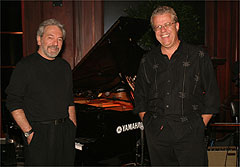 Em entrevista exclusiva, César Camargo Mariano fala sobre o lançamento do DVD Duo, do que pensa sobre a música brasileira, de novos projetos e sobre o novo disco da cantora Gal Costa.
Em entrevista exclusiva, César Camargo Mariano fala sobre o lançamento do DVD Duo, do que pensa sobre a música brasileira, de novos projetos e sobre o novo disco da cantora Gal Costa.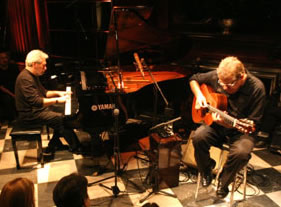 Hoje isso é muito raro. No Brasil isso só acontece através das gravadoras independentes, que também têm uma preocupação com o mercado, mas a visão é diferente. O artista precisa de tempo para ficar dentro do estúdio, para pesquisar, para elaborar um trabalho. Sem correrias...Esse papo de que a gravadora precisa fazer tantos produtos no ano, de que o lançamento tem que ser em tal mês para justificar o investimento é papo para uma indústria normal, de sabonetes, de café, sei lá.... Em música não deveria ser assim. A Biscoito Fino, por exemplo, vai lançar um selo brasileiro de música erudita e isso é maravilhoso! Só uma independente tem esse tempo, esse prazer de fazer um projeto desses.
Hoje isso é muito raro. No Brasil isso só acontece através das gravadoras independentes, que também têm uma preocupação com o mercado, mas a visão é diferente. O artista precisa de tempo para ficar dentro do estúdio, para pesquisar, para elaborar um trabalho. Sem correrias...Esse papo de que a gravadora precisa fazer tantos produtos no ano, de que o lançamento tem que ser em tal mês para justificar o investimento é papo para uma indústria normal, de sabonetes, de café, sei lá.... Em música não deveria ser assim. A Biscoito Fino, por exemplo, vai lançar um selo brasileiro de música erudita e isso é maravilhoso! Só uma independente tem esse tempo, esse prazer de fazer um projeto desses.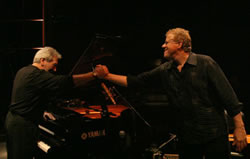 Duos can be tough to pull off, especially for a whole CD, and piano/guitar duos are tougher still. It takes a special kind of mutual craftmanship and understanding for two chordal instruments to make music together without getting in each other's way. Cesar Camargo Mariano, one of Brazil's most respected arrangers and composers (and the widower of the legendary Elis Regina, that country's Edith Piaf), is also a fine player whose uncluttered approach works perfectly with that of Lubambo, the elegant first-call, New York-based Brazilian guitarist. Both have an impeccable sense of rhythm and a soulful, romantic delivery, and have played together often in Mariano's quartet. If anybody can make this format work, it's these two. And they do.
Duos can be tough to pull off, especially for a whole CD, and piano/guitar duos are tougher still. It takes a special kind of mutual craftmanship and understanding for two chordal instruments to make music together without getting in each other's way. Cesar Camargo Mariano, one of Brazil's most respected arrangers and composers (and the widower of the legendary Elis Regina, that country's Edith Piaf), is also a fine player whose uncluttered approach works perfectly with that of Lubambo, the elegant first-call, New York-based Brazilian guitarist. Both have an impeccable sense of rhythm and a soulful, romantic delivery, and have played together often in Mariano's quartet. If anybody can make this format work, it's these two. And they do. 
 Br-Instrumental no Twitter
Br-Instrumental no Twitter




